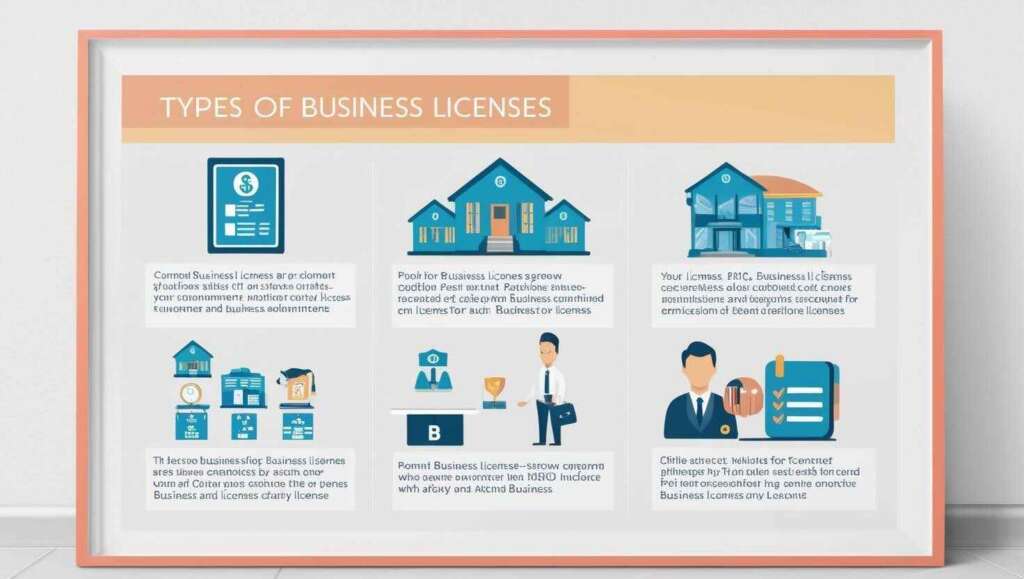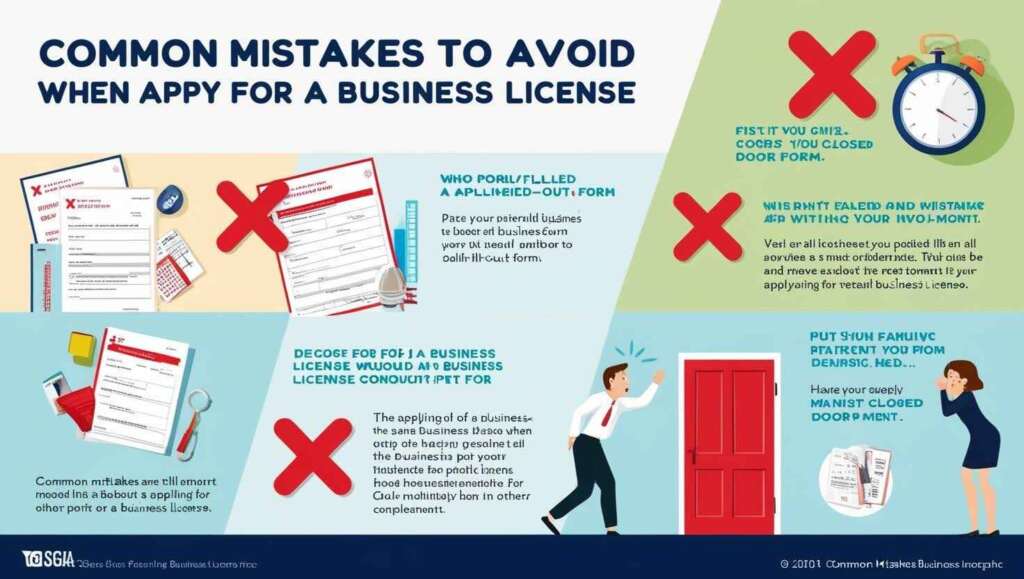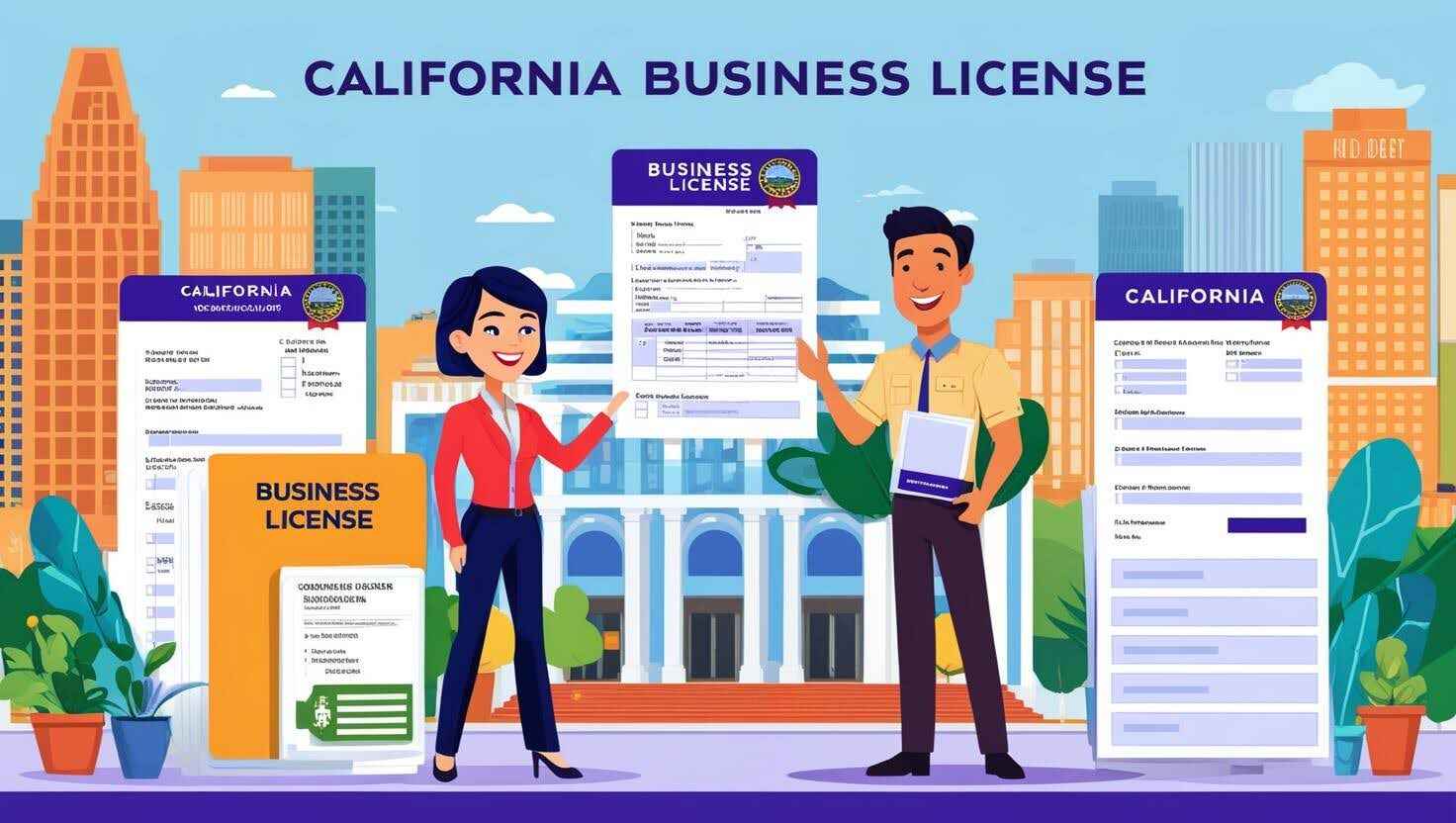Starting a business is an exciting journey, but getting a business license in California can feel like a daunting process. The good news is that with the right guidance, the procedure can be streamlined and stress-free. Whether you’re opening a small online store, a local coffee shop, or a tech startup, understanding how to get a business license is essential to legally operate in the state. This step-by-step guide will walk you through everything you need to know about applying for your business license in California—from figuring out your business structure to understanding the fees and documentation required.
The process doesn’t need to be complicated or intimidating. By breaking down each step and explaining the key elements, you’ll be equipped to handle the application with ease. So, let’s dive into the world of California business licenses and start your entrepreneurial journey on the right foot.
Key Takeaway: Getting a business license in California doesn’t have to be overwhelming. With the right knowledge, you can navigate the process confidently and set your business up for success.
Why Do You Need a Business License in California?
When it comes to starting a business in California, one of the first things you’ll need to do is get a business license. But why is this step so important, and what exactly does it mean for your business?
A business license is essentially a government-issued permit that allows you to operate legally within a specific jurisdiction. In California, this license ensures that you are complying with state and local regulations, such as zoning laws, health and safety standards, and tax obligations. Without it, your business could face legal penalties, fines, or even closure.
California is known for having stringent laws around business operations, and obtaining a license is one of the first steps to prove you’re operating in compliance with those laws. But it’s not just about avoiding legal trouble. Having a business license can boost your credibility with customers, suppliers, and financial institutions. It also helps ensure that you’re paying the right taxes and meeting necessary industry regulations.
Many entrepreneurs are surprised to find out that different cities and counties have different requirements for obtaining a business license. For instance, a business operating in Los Angeles might need different paperwork than one in San Francisco. That’s why it’s essential to check both state and local rules when applying.
Legal and Financial Penalties of Operating Without a Business License
If you skip this crucial step and operate without a valid license, you may be subject to a variety of penalties. At best, this could mean fines or business shutdown orders from local authorities. At worst, it could lead to significant legal fees, back taxes, and even criminal charges in extreme cases. To avoid this, make sure to complete all necessary licensing steps before you start operations.
Key Takeaway: A business license in California is more than just a legal requirement—it’s a safeguard for your business’s operations and reputation. It also ensures you comply with both local and state regulations.
Types of Business Licenses in California

Understanding the types of business licenses you may need is an essential part of starting your business in California. Depending on your industry, location, and business structure, the type of license you require can vary.
General Business License
Most businesses in California will need to obtain a general business license. This license, also known as a “business tax certificate,” is required to legally operate in many cities and counties across the state. The general business license is often a relatively simple process to apply for and typically involves registering your business name and paying a fee. The cost varies by location and business type but generally ranges from $50 to $200 annually.
It’s important to note that the general business license is typically issued by your city or county’s business tax office. In major cities like Los Angeles or San Francisco, the process may be conducted online, while smaller municipalities may require in-person visits. Some cities also require you to renew the license annually, which can sometimes include a small fee increase.
Specialized Licenses and Permits
In addition to the general business license, some businesses in California will need specialized licenses or permits based on their industry. For example, restaurants and food trucks will need health permits, while businesses dealing with alcohol or tobacco will need additional state-level permits. Other industries like construction or legal services will also require specific licenses.
- Health Permits: If you plan to operate a food-related business, such as a restaurant or catering service, you’ll need to obtain a health permit from the California Department of Public Health (CDPH). This ensures that your business meets the state’s sanitation and food safety standards.
- Professional Licenses: Professions like real estate, law, and accounting require professional licenses issued by state regulatory agencies. These licenses demonstrate that you have the necessary qualifications and training to offer these services.
Zoning and Local Permits
Before applying for your business license, be sure to check whether your business complies with local zoning laws. Zoning laws dictate where businesses can operate based on their type. For example, you might not be able to run a retail store out of a residential area. Local zoning laws may require additional permits, such as building or signage permits, if you plan to modify your location or put up a sign.
Key Takeaway: In addition to the general business license, certain industries may require specialized permits or licenses to ensure compliance with safety, health, and zoning regulations. Be sure to research your specific industry’s needs before applying.
Source: California Department of Tax and Fee Administration
Step-by-Step Guide to Getting Your Business License in California
Now that you understand why you need a business license and the types available, let’s walk through the process step-by-step.
Step 1: Determine Your Business Structure
The first step in applying for a business license is deciding what type of business structure you’ll use. Will you operate as a sole proprietorship, a partnership, or form an LLC or corporation? Your choice will affect the type of license you need, how you file taxes, and the legal protections you’ll have.
- Sole Proprietorship: If you’re operating as a solo entrepreneur, a sole proprietorship might be your easiest and least expensive option. This structure doesn’t require formal registration, but you will still need a business license.
- LLC or Corporation: If you’re forming a Limited Liability Company (LLC) or a corporation, you’ll need to file with the California Secretary of State. In addition to obtaining your business license, you’ll need to register your business name and pay the filing fees.
Step 2: Check Local Requirements
Once you’ve decided on your business structure, the next step is to check the local regulations in the city or county where you plan to operate. California’s local governments have their own requirements for business licenses, which can differ significantly from one municipality to another. Some cities may require additional permits, and others may have different fee structures.
You can usually check with the city’s business office or visit their website to get a list of requirements and the necessary forms. For instance, businesses operating in Los Angeles must apply through the Office of Finance, while in San Diego, applications go through the city’s Treasurer-Tax Collector.
Step 3: Gather Your Documents
Before you apply for your business license, you’ll need to gather the necessary documentation. These may include:
- Your federal tax ID number (EIN) or Social Security Number (for sole proprietors).
- Proof of your business name (DBA or “Doing Business As” registration).
- Zoning information to ensure that your business complies with local zoning laws.
Step 4: Submit Your Application
Once you’ve gathered all the required documents, it’s time to submit your application. Depending on your location, you can do this online or in person. Most cities in California offer online application portals, which can speed up the process.
Step 5: Pay Fees
Fees for business licenses vary depending on the location and the type of business you’re operating. These fees can range from $50 to several hundred dollars. Be prepared to pay your fees when you submit your application.
Key Takeaway: Determining your business structure and checking local requirements are essential first steps. Be sure to gather all necessary documents and apply online if possible to streamline the process.
What to Do After You Receive Your License
Congratulations! You’ve successfully obtained your business license, and now it’s time to ensure that you maintain compliance and make the most of your newly acquired legal status. But what happens next? Here are some essential steps to take after receiving your California business license:
Displaying Your Business License
Once you have your business license in hand, it’s crucial to display it in a location that is visible to customers and authorities. While the specific requirements for displaying your license may vary depending on the city or county, in most cases, you’ll need to keep it prominently posted at your business location. For home-based businesses, you may be required to have it accessible upon request during inspections or if you are visited by local authorities.
If you have an online business, displaying your business license might not be a physical requirement, but you should keep it on file and be prepared to provide it if needed for financial institutions, business partners, or customers.
Renewing Your Business License
Most business licenses in California are valid for a year and must be renewed annually. The renewal process generally involves filling out a form and paying the renewal fee. Keep in mind that fees may increase slightly each year, so it’s essential to stay up-to-date with your city or county’s renewal process to avoid any penalties.
Renewal notices are typically sent out a few months before your business license expires. However, it’s your responsibility to keep track of the expiration date and ensure you complete the renewal process on time. Some cities and counties allow you to renew your license online, which can make the process quicker and more convenient.
Key Takeaway: After receiving your license, ensure it’s displayed correctly and start planning for your annual renewal to stay compliant with local regulations.
Common Mistakes to Avoid When Applying for a Business License

While applying for a business license may seem straightforward, many entrepreneurs make simple yet costly mistakes. Here are a few common errors to avoid during the process:
Forgetting Local and State Requirements
One of the most common mistakes when applying for a business license is neglecting to check both local and state requirements. Many entrepreneurs mistakenly assume that getting a license from one government authority covers all their bases. However, California’s licensing system is multi-tiered, meaning both state and local agencies often have different regulations.
For instance, if you’re opening a business in Los Angeles, you’ll need to comply with Los Angeles City’s business tax regulations, as well as any other state-specific laws. Failure to meet local zoning requirements or missing a specific city ordinance could result in delays or even fines.
Submitting Incorrect or Incomplete Documents
Another common pitfall is submitting incomplete or incorrect paperwork. The business license application requires a variety of documents, including proof of your business name (if applicable), tax ID numbers, and proof of insurance. Make sure all the required information is accurate and complete.
Even a small mistake—such as misspelling your business name or failing to provide the proper documentation—could cause your application to be delayed or rejected. This could lead to unnecessary stress and lost time. Double-check your paperwork and make sure you’ve gathered everything you need before submitting it.
Key Takeaway: Double-check all requirements and documentation before applying. Avoiding these simple errors can save you time, money, and stress.
FAQs
- What is the cost of getting a business license in California?
- The cost of obtaining a business license varies by city and business type. Typically, fees range from $50 to $200 annually. Larger businesses or those in regulated industries may face higher fees.
- How long does it take to get a business license in California?
- The timeline can vary depending on the city or county, but in general, you can expect to receive your license within 2-4 weeks. Some cities offer expedited services for an additional fee.
- Do I need a business license if I’m just working from home?
- Yes, even home-based businesses are required to obtain a business license in California. However, you may need to check local zoning laws to ensure your business activities are permitted in a residential area.
- Can I get a business license without a business name?
- If you plan to operate under your personal name, you may not need to file a DBA (Doing Business As). However, if you want to operate under a different name, you’ll need to register it before applying for a business license.
- What happens if I don’t renew my business license on time?
- Failing to renew your business license on time can result in penalties, late fees, or even the revocation of your license. Stay on top of renewal dates to avoid these consequences.

